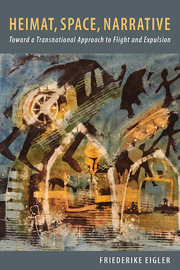Book contents
- Frontmatter
- Dedication
- Contents
- Acknowledgments
- Introduction: Geocritical Approaches to Place-Bound Belonging
- Part I Reassessing the Study of Heimat, Space, and Postwar Expulsion
- 1 Heimat and the Spatial Turn
- 2 Narrative and Space
- 3 Flight and Expulsion
- Part II Horst Bienek's Novels on Upper Silesia (1975–82)
- Part III Contemporary Novels
- Conclusion: “Lived Spaces” in Literary Narratives
- Filmography
- Works Cited
- Index
2 - Narrative and Space
from Part I - Reassessing the Study of Heimat, Space, and Postwar Expulsion
Published online by Cambridge University Press: 05 August 2014
- Frontmatter
- Dedication
- Contents
- Acknowledgments
- Introduction: Geocritical Approaches to Place-Bound Belonging
- Part I Reassessing the Study of Heimat, Space, and Postwar Expulsion
- 1 Heimat and the Spatial Turn
- 2 Narrative and Space
- 3 Flight and Expulsion
- Part II Horst Bienek's Novels on Upper Silesia (1975–82)
- Part III Contemporary Novels
- Conclusion: “Lived Spaces” in Literary Narratives
- Filmography
- Works Cited
- Index
Summary
My point of departure for chapter 1 was the lack of attention to issues of place and space in the study of Heimat. In the present chapter I examine the role of space in the study of narrative. A cursory glance at established narrative theories (see Genette or Stanzel) illustrates that “time” receives far more attention than “space.” One explanation for this imbalance is the association of space—presumed to be permanent— with descriptive rather than narrative texts. There are two problematic assumptions at play here: the idea that narrative and descriptive elements can be neatly separated, and the assumption that space is not subject to change. Among the approaches in narrative theory and cultural studies that do consider the role of space in more detail are the works of Yuri Lotman, Mikhail Bakhtin, and Michel de Certeau—all of which will be discussed below.
My objective in this chapter is twofold: First, to consider briefly geo-critical approaches in literary studies with a special focus on the underlying notions of space. Second, to explore narratological concepts that advance the analysis of spatial features in prose fiction in general and in representations of Heimat in particular. I start out with brief meta-critical reflections on geocriticism and its implications for the present study. In the main part of this chapter, I seek to connect these general considerations to the nuts and bolts of textual work, that is, to the narrative analysis of spatial constellations. Some but not all of the narrative concepts I discuss here will then be “tested” in the analysis of novels in parts II and III of this study.
- Type
- Chapter
- Information
- Heimat, Space, NarrativeToward a Transnational Approach to Flight and Expulsion, pp. 31 - 50Publisher: Boydell & BrewerPrint publication year: 2014



